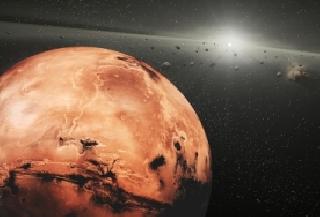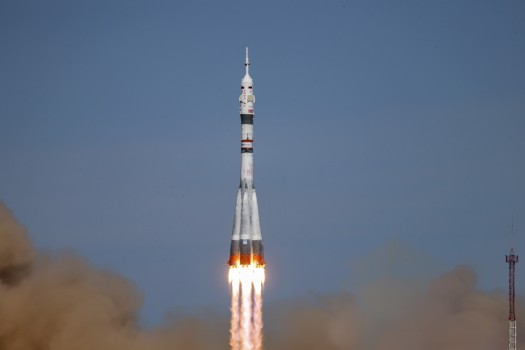
A NASA image.
WASHINGTON (PTI): Mars, not Earth, plays a role in "refreshing" some near-Earth asteroids, causing the space rocks to appear redder than meteorites, MIT scientists have found.
The gravity of the Red Planet causes the asteroid's surface material to shift, exposing fresh material, which explains the colour variation previously observed.
Richard Binzel, a professor of planetary sciences at Massachusetts Institute of Technology (MIT) and colleague Francesca DeMeo calculated the orbits of 60 refreshed asteroids, and found that 10 per cent of these never cross Earth's orbit.
Instead, these asteroids only come close to Mars, suggesting that the Red Planet can refresh the surfaces of these asteroids.
"We don't think Earth is the only major driver anymore, and it opens our minds to the possibility that there are other things happening in the Solar System causing these asteroids to be refreshed," said DeMeo.
The idea that Mars may shake up the surface of an asteroid is a surprising one: The planet is one-third the size of Earth, and one-tenth as massive -- and therefore exerts a far weaker gravitational pull on surrounding objects.
But Mars' position in the Solar System places the planet in close proximity with the asteroid belt, increasing the chance of close asteroid encounters.
"Mars is right next to the asteroid belt, and in a way it gets more opportunity than the Earth does to refresh asteroids," Binzel said.
"So that may be a balancing factor," said Binzel.
DeMeo, who suspected that Mars may have a hand in altering asteroid surfaces, looked through an asteroid database created by the International Astronomical Union's Minor Planet Center.
The researchers looked at 60 asteroids, mapping out the orbit of each and determining which orbits had intersected with those of Earth or Mars.
DeMeo then calculated the probability, over the last 500,000 years, that an asteroid and either planet would have intersected, creating a close encounter that could potentially generate asteroid quakes.
"Picture Mars and an asteroid going through an intersection, and sometimes they'll both come through at very nearly the same time," Binzel said.
"If they just barely miss each other, that's close enough for Mars' gravity to tug on (the asteroid) and shake it up. It ends up being this random process as to how these things happen, and how often," said Binzel.
From their calculations, the researchers found that 10 per cent of their sample of asteroids only cross Mars' orbit, and not Earth's.
 Previous Article
Previous Article Next Article
Next Article












The Indian Air Force, in its flight trials evaluation report submitted before the Defence Ministry l..
view articleAn insight into the Medium Multi-Role Combat Aircraft competition...
view articleSky enthusiasts can now spot the International Space Station (ISS) commanded by Indian-American astr..
view article